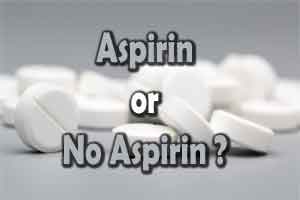- Home
- Editorial
- News
- Practice Guidelines
- Anesthesiology Guidelines
- Cancer Guidelines
- Cardiac Sciences Guidelines
- Critical Care Guidelines
- Dentistry Guidelines
- Dermatology Guidelines
- Diabetes and Endo Guidelines
- Diagnostics Guidelines
- ENT Guidelines
- Featured Practice Guidelines
- Gastroenterology Guidelines
- Geriatrics Guidelines
- Medicine Guidelines
- Nephrology Guidelines
- Neurosciences Guidelines
- Obs and Gynae Guidelines
- Ophthalmology Guidelines
- Orthopaedics Guidelines
- Paediatrics Guidelines
- Psychiatry Guidelines
- Pulmonology Guidelines
- Radiology Guidelines
- Surgery Guidelines
- Urology Guidelines
Aspirin useful for primary prevention of CVD in many patients, new study refutes guidelines

Refuting earlier studies and guidelines, a new study affirms role of daily aspirin in primary prevention of CVD in many patients although it emphasizes that it will be better if the treatment is personalised.
Daily aspirin may benefit many patients without existing cardiovascular disease, finds new study. This is another study refuting the findings of some studies advocating against the role of aspirin in primary prevention. The instant study finds that the benefits of aspirin may outweigh the risks for many patients without known cardiovascular disease (CVD). Such patients could be identified by using a personalized benefit–harm analysis, which could inform discussions between doctors and patients. The findings are published in the Annals of Internal Medicine.
Aspirin reduces the risk of CVD in at-risk patients but also increases the risk of bleeding. It is not clear if the benefits of aspirin outweigh the risks for patients without known CVD.
Please also read-Aspirin not recommended for healthy elderly: ESC 2019 Update
Researchers from the University of Auckland, New Zealand studied 245,028 persons (43.6 per cent women) aged 30 to 79 years without established CVD to identify persons for whom aspirin would probably result in a net benefit. The net effect of aspirin was calculated for each participant by subtracting the number of CVD events likely to be prevented from the number of major bleeds likely to be caused over 5 years. The data were derived from PREDICT, a well-characterized web-based decision support program integrated with electronic primary care practice management systems in New Zealand. The researchers found that 2.5 per cent of women and 12.1 per cent of men without established CVD were likely to derive a net benefit from aspirin treatment for 5 years if a hospitalization or death due to an acute CVD event was considered equivalent to hospitalization or death due to an acute major bleed. These percentages increased to 21 per cent of women and 41 per cent of men when one CVD event was assumed to be equivalent to two major bleeds.
Please also read-Aspirin does not increase risk of bleeding in hemorrhagic stroke: Lancet
The author of an editorial from the Cardiovascular Institute, Rutgers Robert Wood Johnson Medical School cautions that the study findings may not apply to populations outside New Zealand. Also, participants over the age of 79 were not included in the analysis. The author points to the diversity of findings in several aspirin studies to conclude that making firm, evidence-based recommendations for aspirin use for primary prevention is difficult.
For further reference log on to :

Disclaimer: This site is primarily intended for healthcare professionals. Any content/information on this website does not replace the advice of medical and/or health professionals and should not be construed as medical/diagnostic advice/endorsement or prescription. Use of this site is subject to our terms of use, privacy policy, advertisement policy. © 2020 Minerva Medical Treatment Pvt Ltd